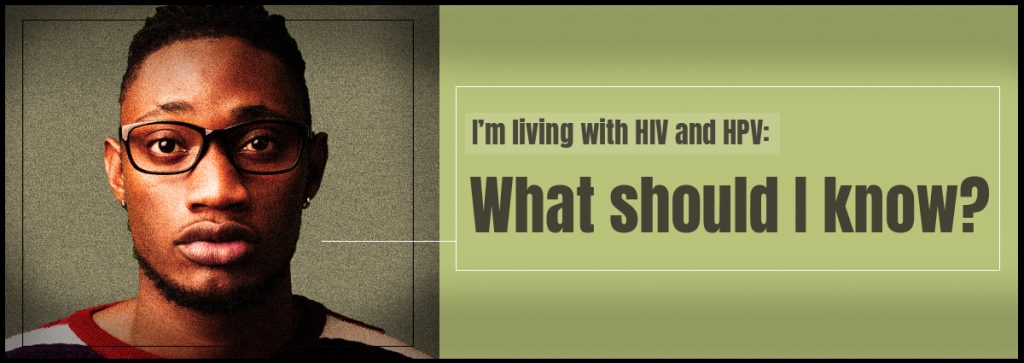By: Ann K. Avery, MD, Infectious Disease Physician at MetroHealth Medical Center

Living with HIV and another illness is called a coinfection, which happens because HIV weakens your immune system’s ability to fight off other illnesses. Some people living with HIV also are living with something called human papillomavirus (HPV). We’re going to talk about some important stuff you should know when it comes to living with both HIV and HPV.

HIV and HPV: The basics
Now, we already know that HIV decreases a person’s CD4 count, which impacts the immune system. If your immune system is compromised, then the chances of becoming infected with HPV go up. Likewise, your body will have a much harder time trying to fight off HPV with a weakened immune system.
What is HPV? HPV stands for Human Papilloma Virus, and it is one of the most common sexually transmitted infections. HPV is sexually transmitted through vaginal, oral, or anal sex and has also been known to pass from skin-to-skin contact during sex. Though HPV may sound like it’s just one virus, there are more than 100 different types! Many types of HPV don’t ever show symptoms and clear up by themselves within a year. Some types of HPV cause genital warts.
Other types are more dangerous and can cause genital warts and even be a risk factor for different types of cancer. According to the Centers for Disease Control, “HPV is thought to be responsible for more than 90% of anal and cervical cancers, about 70% of vaginal and vulvar cancers, and more than 60% of penile cancers. Oropharyngeal (a fancy word for mouth and throat) cancers traditionally have been caused by tobacco and alcohol, but recent studies show that about 70% of cancers of the mouth and throat may be linked to HPV.” A review of data from 2011 to 2015 suggests that approximately 42,700 cases of HPV-associated cancers occur in the United States each year.
If you want more of a refresher on what HPV is, take a look at this great blog post we put together all about it.

What to know when living with both
Having a coinfection of HIV and HPV means it’s more important than ever to keep up with your HIV treatment and stay undetectable. Doing this keeps you as healthy as possible and will make it easier for your body to fight off HPV.
When you’re living with both HIV and HPV, regularly visiting your HIV doctor gives you a clear picture of where you’re at health-wise, and following their prescribed course of treatment puts you in charge. Once you have an idea of where you are, you can take some action to help you get where you want to be. It also increases the chances of identifying HPV-associated cancers early, if that were ever to become a reality for you. In general, the earlier the cancer is detected the better your options for treatment and their success rate.
Come join our private, stigma-free, supportive community.
Health management tools with medication & appointment reminders.
Social networking in a community conversation & private chats.
Vaccines, treatment, and prevention
The good news is that there are some ways to treat or even prevent HPV. Vaccinations are available, and some people may have already gotten vaccinated as a teenager. People living with HIV have compromised immune systems, which makes it important to get vaccinated if they haven’t already. Everyone can benefit from HPV vaccination and you should especially consider it if you’re transgender or a man who has sex with men.
Most HPV vaccines can be given up to age 26, though there are some “catch-up” vaccines available for people, up to age 45, who haven’t been vaccinated. Getting vaccinated against HPV can also help prevent cervical and anal dysplasia, a pre-cancerous condition where cells become abnormal.
When you’re living with HIV and HPV, it’s a good idea to get screened regularly for cancer. For women, it’s yet another reason to get an annual Pap smear. Anyone who has anal sex, particularly men who have sex with men, should get screened, using an anal pap, during a regular HIV visit. Many HIV docs will even teach their patients how to self-swab their bums! It’s often more comfortable for everyone that way. 🙂
A common symptom of HPV is genital warts. Many times, though, warts caused by HPV go away on their own, but when they don’t, your doctor may prescribe a topical medication to help shrink them. Warts can also sometimes be removed at the doctor’s office.
The best way to prevent cancer-causing strains of HPV is to get vaccinated. We also recommend condoms and dental dams as barrier methods to reduce the risk of transmission.

Staying healthy
Thanks to science and the development of new treatments, it’s totally possible to live with both HIV and HPV and be in great health. In fact, many of the healthy habits that you already practice when living with HIV also work to prevent or reduce the impact of HPV, like seeing your doctor, staying on top of your meds, and practicing smart sex.
If you are living with both HIV and HPV, there’s no need to worry, or to put in twice as much effort. Take good care of yourself, see your doctor regularly, and aim to live a happy, healthy life.
Related Blogs:


